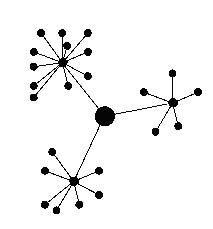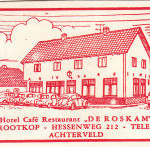From Big Brother to Radical Decentralization
1 Comment In the past centuries governing has become more centralized, out of necessity and because it made the most sense. The state and its organizations, national as well as international, will not disappear as sources of power and government. However, they can no longer govern alone.
In the past centuries governing has become more centralized, out of necessity and because it made the most sense. The state and its organizations, national as well as international, will not disappear as sources of power and government. However, they can no longer govern alone.
Many things will have to be radically re-organized. Districts organize their own waste collection and every home is energy supplier. The adage for the next decennium will be: Radical Decentralization.
Sun and waste
Governed from Beijing and in its well-known particular brand of go getting, China is creating giant fields full of solar panels in the Gobi desert. The European Union has found the spirit after the accession of 10 new countries in 2004 and is getting ready to accept the rest of former Yugoslavia (Croatia, Bosnia and Herzegovina, Serbia, Montenegro, Kosovo and Macedonia) after the accession of Slovenia. The role of centralized government is far from played out. And yet a different trend marks the second decennium of this century: Radical decentralization, meaning organizing general interest issues on a micro scale. The size of the scale varies, and ends with the individual. Currently, individualism is not a popular term and brings to mind images of self-enriching bankers. That is one side of the coin. Thanks to the high level of education of for instance Western societies and ongoing technological advancements, we are more than ever capable of shaping our own lives, which creates great opportunities for the individual as well as for society at large. It does require changes from bureaucrats and administrators. In the next decade they will either have to adjust or make room for new ones.
Radical decentralization is made possible by the technological advances of the past twenty years and an increasingly higher educated population. Since we are now both intellectually and practically able to shape a large part of our lives as we see fit, we expect the same from the service providers we encounter in our daily lives. It doesn’t matter whether these are housing corporations, banks or (local) governments. We expect all these providers to function quickly, efficiently and customer focused. If they don’t, we will take matters into our own hands. Why? Because we can! A telling example can be found in England. A number of districts have started organizing their own waste collection. The inhabitants were not satisfied with the frequency and quality of the municipal service. Organizing the inhabitants of a district is a breeze with the help of a Facebook page, making it easy to set up an initiative such as this one. The municipality pays 75% of what they would have spent and the inhabitants buy the service from a private party. Everybody benefits: The city spends less money and the people are now responsible for something they always complain about. The net return: Probably less nagging about politics and more unity within the district.
The Netherlands is not standing still and a better distribution of responsibilities between citizen and government is made possible by technological advances. The city of Eindhoven premiered an iPhone app called BuitenBeter (OutsideBetter) this year. This app makes it easy to file a complaint about trash on the streets or streetlights that don’t work. Take a picture of the complaint with your iPhone and with one tap the complaint is not only filed, but sends along the exact location. Instead of turning the government into Big Brother, the iPhone makes individual citizens into “Little Brothers”. Whether it serves our privacy remains to be seen, but fact is that the Internet plays a central role in these developments. Social media offer the possibility of self-organization and growing access to mobile Internet makes it easier to take action. Services that previously could only be centrally organized are now returning to those who want and are able to take responsibility for the lives they lead. The same trend can be observed in the way people are increasingly able to decide how and where they choose to work for their employers.
No place like hub
Thanks to, among other things, the Internet and the service economy, more and more employees work from home, one or more days a week. Combined with the fact that increasingly more Dutch people choose to be entrepreneurs, many homes have become a part-time office. While running a business from the attic or spending a workday with a view of dirty dishes is all well and good, people are social creatures and prefer the company of a group. The result is the rise of the hub: An office for small businesses and freelancers aimed at inspiring each other, or at the very least having social interaction at the coffee machine. It’s simply more fun working with other people than pining away with your laptop behind the geraniums. A place in the neighborhood where you can set up your laptop, get a nice cappuccino and meet potential business partners – this is the main attraction of a hub. Since one of the reasons for working at home is the time wasted on commuting, every neighborhood should have a hub.
A housing corporation could easily fill this need. Bank branches that have become obsolete with the rise of online banking may also have a second life this way. Services that were previously only available at a bank branch are now Internet only. An easy way of cutting costs, but it also cuts down on interaction with the client. Bank branches are perfect to redesign into hubs. Clients and potential clients of the bank work there for a day (or two) and schedule their meetings there. When projects come up that require financial advice or assistance, it is a no-brainer where to find it.
Energy
One of the sectors that will for sure encounter radical decentralization in the next decade is the energy sector. For the longest time it made the most sense to generate energy centrally and then distribute it. It meant the end of coal stoves. Although it is still convenient to have a central power grid, in ten years time we may be better off decentralizing it. The advance of solar panel technology will have turned our homes into the main energy producers, with solar panels on the roofs and in our windows. Combined with windmills and bio mass technology, the more than 7 million home in the Netherlands will produce the energy necessary for powering our houses, cars and industry. One might say we have written off the light bulb too soon.
Since housing corporations (there they are again) own over 2,5 million homes, in ten years time they will potentially be the largest energy producer in the Netherlands. A keen member of the House of Parliament still has to file a motion: By law housing corporations can only occupy themselves with housing. Meaning the building or buying of houses and subsequently managing, renting or selling these houses. One could argue that installing solar panels is part of managing, but it involves huge investments. It is no wonder many corporations are hesitant. Smart homeowners are already working on it. All those sleeping Owners Associations will be wide-awake in a few years. There is money to be made with the house we live in, by producing decentralized energy and selling it to the central grid. It’s radical decentralization in optima forma!
Do it yourself
The social implications of widespread decentralization are manifold. The current generation of young citizens has grown up in a society in which marching in a demonstration or the membership of a political youth organization or union is no longer an important political act. It’s much more interesting to try and change something yourself than to surrender to an organization on which you have little to no influence. We all shape society with the thousands of decisions we make each day and when we use these decisions for the good, then we are really acting in a revolutionary way. Do it yourself – future adult generations will shape their citizenship by solving small and big issues themselves. Add to this the fact that the citizen of the future will – more than ever – be able to have a fast and big impact on society with a good idea by using the available network and means. In order to achieve this we must combine commercial and social interests in a new way of “doing business in public”. In doing this, we will radically transform today’s problems into tomorrows opportunities by using new insights and techniques. Such a bottom-up approach gets the best out of citizens and is one of the most empowering forces of the future.
A bigger contrast with last century is virtually impossible. Where the 20th century was top-down, the 21st is not only bottom-up but also horizontal: Networks take the place of organizations, the power of the group is replaced by the power of your connections. The number is interesting, but even more important is the quality (how well can you relate to another?) and the diversity (how do you and your network improve the network of your connections?). Most connections will be local, just like now, but the rest of the world is never more than 3 connections away. Hyper local and global will go hand in hand. For environmental organizations, which will be able to stop worrying about clean energy, there’s a good chance that in the future more money will be raised from networks like that than from the government. The question will be whether that’s still an issue. From energy shortages we will go to food and space shortages, and environmental organizations will organize themselves around these themes. They could do this by advising all those districts making money by selling energy about how they can produce their own food locally. You have to do something with your money and investing in tomatoes from your own district will become an interesting option. Environmental organizations will roll up their sleeves, bring together local and global networks of people and organizations and work on realizing their ideals.
 Other institutions will have to roll up their sleeves as well. Knowledge is an important condition for taking initiative at any level. In order to gain knowledge we need transparency. The fact that they had insight in the costs of waste collection for the city, helped make it possible for citizens in England to unite and organize their own waste collection. Both England and the United States are radically transparent in a number of ways. Whether it’s government costs, crimes committed in a district or licenses granted by the local government, it can all be found on the Internet.
Other institutions will have to roll up their sleeves as well. Knowledge is an important condition for taking initiative at any level. In order to gain knowledge we need transparency. The fact that they had insight in the costs of waste collection for the city, helped make it possible for citizens in England to unite and organize their own waste collection. Both England and the United States are radically transparent in a number of ways. Whether it’s government costs, crimes committed in a district or licenses granted by the local government, it can all be found on the Internet.
Knowledge is power, and citizens and corporations will become more powerful by transparency. It allows people to take action when they feel things can be done differently: Cheaper, more humane, more sustainable or whatever cause they pursue. Dutch society can no longer be caught in the web of 100-year-old institutional arrangements. We are consumers, citizens, entrepreneurs and much more. All these roles have taught us better. Let’s transform this attitude of “knowing it all” into action. Let the consumer, citizen, entrepreneur or employee take the wheel and start the engine. It’s in our common interest.
—
Farid Tabarki is founder and director of Studio Zeitgeist. He has been researching the (European) zeitgeist since 2000. His insights are successfully used in several (international) organizations. He has been involved with Coolpolitics since its beginnings, has advised Internet company Hyves, the International Filmfestival Rotterdam and ‘The City’- European Centre for Culture and Debate in Belgrade. Farid has done research for the Open Society Institute and the Netherlands Institute for Social Research (Sociaal Cultureel Planbureau) and has organized the Berlin Conference (for the civil society initiative ‘A Soul for Europe’. He presents TV shows such as MTV Coolpolitics and Durf te Denken, van Socrates tot Sartre (Dare to Think, from Socrates to Sartre). As co-founder of The Finishing School Farid supports and encourages top talent from governments and corporations to develop further. More information can be found at www.studiozeitgeist.eu, www.finishingschool.nl and www.radicaldecentralisation.com
—
This article has been published before in the collection ‘Dappere Nieuwe Wereld’, edited by Joop Hazenberg, Farid Tabarki en Rens van Tilburg
* Translation: sunnyny, Amsterdam
You May Also Like
Comments
One Response to “From Big Brother to Radical Decentralization”
Leave a Reply









May 16th, 2013 @ 12:01 pm
See also: Zeynep Gunduz & Marjan Delzenne – Budget Monitoring and Citizen Participation in The Netherlands: http://rozenbergquarterly.com/?p=4991